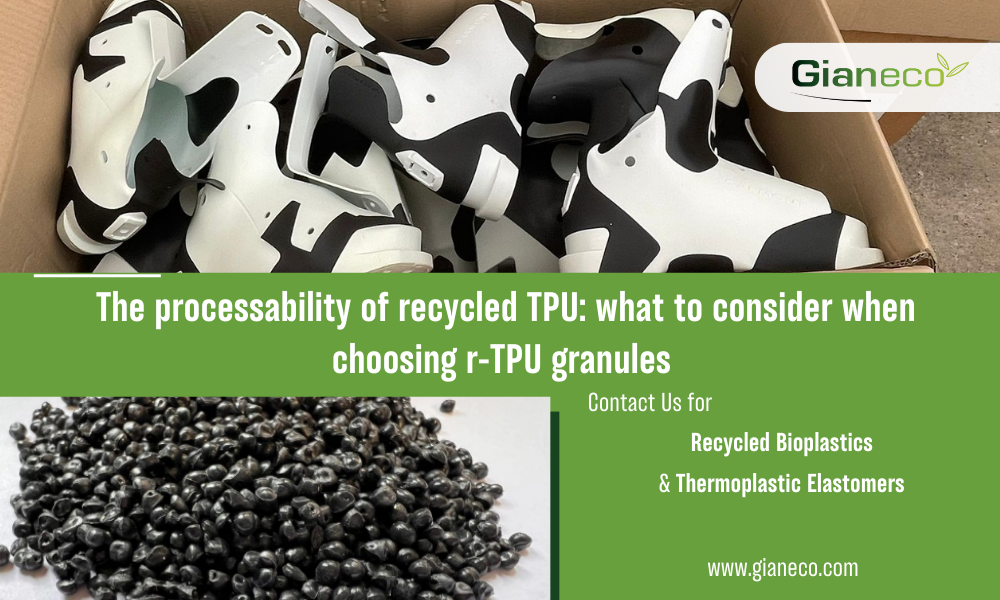The growing interest in sustainability has led many industries to explore the use of recycled materials, including TPU (thermoplastic polyurethane), a material known for its versatility and processability.
Recycled TPU is a material that is produced from TPU waste. It is a sustainable material that offers a number of advantages over virgin TPU, including a lower carbon footprint and lower cost.
However, this thermoplastic material compared to virgin TPU has some differences, which may affect its processability. In this article, we will discuss some factors to consider when deciding to use recycled TPU granules in production processes.

The processability of recycled TPU
Before engaging in the use of recycled TPU, it is important to work with reliable suppliers and ensure that the material meets certain quality standards.
The processability of recycled TPU is influenced by:
1. Quality and cleanliness of the material. Quality control is essential to ensure that the material is suitable for its intended use. Contaminants or impurities can compromise the processability and quality of the final product;
2. Temperature is a key parameter in all processing of recycled TPU. An adequate temperature is necessary to achieve uniform melting and optimal processability;
3. Processing pressure and speed must be carefully controlled to avoid problems such as deformation, bubbles or inhomogeneity in the structure of the processed recycled TPU.
Careful control of the process parameters, together with the selection of an appropriate machining process, is crucial to ensure the optimal processability of this thermoplastic elastomer and the production of quality products.
It is important to consider how recycled TPU fits into the existing processes in your production chain. This may require adjustment of melt temperatures, pressure and cycle times to achieve the desired results.
This recycled elastomer can be processed using the same processes as virgin TPU, including:
Extrusion: recycled TPU can be extruded to produce a variety of products, including profiles, tubes and sheets. During extrusion, the material is melted and pushed through a screw into a die to create a continuous profile or sheet.
Temperature, extrusion speed and pressure influence the quality of the final product. The recycled TPU must be carefully prepared to ensure that any contaminants are removed to avoid problems during extrusion.
Injection Moulding: The injection moulding process is widely used for the production of complex parts. Recycled TPU is melted and injected into a mould under high pressure.
The temperature of the recycled TPU, injection pressure and cooling time are critical parameters that affect the quality and processability of the final product.
Compression Moulding: Compression moulding involves placing the previously melted recycled TPU inside an open mould, followed by closure and compression.
This process is suitable for the production of large parts or parts with complex geometries.
Thermoforming: Thermoforming involves heating a recycled TPU sheet until it becomes flexible and then forming it in a mould by suction or compression.
Temperature and cooling time are critical factors affecting the processability of recycled TPU in this process.
3D printing: 3D printing is an emerging method that enables the production of three-dimensional objects. Recycled TPU can be used as a filament for 3D printing.
Nozzle temperature, extrusion speed and print bed temperature affect the quality and processability of the printed product.
However, there are some differences to consider when processing recycled TPU:
Variability in properties: recycled TPU can exhibit greater variability in properties than virgin TPU.
Processing temperatures: Recycled TPU may require higher processing temperatures than virgin TPU.
Lubricants: the use of appropriate lubricants can help reduce friction and tool wear.
Gianeco's 5 tips for improving the machinability of recycled TPU
Here are five key tips to improve the processability of recycled TPU:
1.Use appropriate equipment and tools: it is important to use equipment and tools designed to machine TPU.
2. Reduce processing speed: too high a processing speed can cause processing problems, such as blistering and delamination.
3. Use appropriate machining temperatures: too low a machining temperature can cause machining problems, such as warping and cracking.
4. Use appropriate lubricants: lubricants can help reduce friction and tool wear.
5.Perform a material moisture analysis: In general, many thermoplastic materials are sensitive to moisture and can absorb water from their environment.
Absorbed moisture can adversely affect the quality of the material during the extrusion process.
If the TPU has been stored in humid conditions or has a high initial moisture content, it is advisable to carry out a drying process prior to extrusion to remove excess moisture. This can help prevent problems such as bubbles or irregularities in the surface of the extruded product
Reduce processing speed: too high a processing speed can cause processing problems, such as blistering and delamination.
Contact Gianeco for 100% recycled TPU granules
Recycled TPU is a sustainable and versatile material that offers a number of advantages over virgin TPU. The use of recycled TPU contributes to sustainability and the reduction of plastic waste, offering a significant environmental benefit.
The processability of recycled TPU is a key element to consider when deciding to adopt recycled materials in manufacturing. With the right source, material quality, quality control and process adaptation, recycled TPU can offer the same performance and sustainable benefits as virgin TPU.
Choosing the appropriate process and carefully controlling process parameters are essential to ensure optimal processability of recycled TPU and the production of quality products.
Choosing to process recycled TPU granules is an important step towards more sustainable and environmentally responsible production.
Consult Gianeco's recycled thermoplastic elastomer granules today and schedule a call to define the best product to test in your production.
If you are involved in consultancy or generally want to test new recycled materials in your own production or in the production of customers you directly follow, please contact Gianeco.
Below are the contact details of our Co-Founder and Thermoplastic Elastomers Specialist





